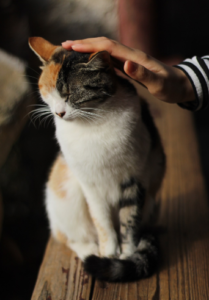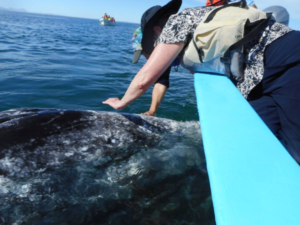Animal Communication…Are They Paying Attention?
If the animal is not paying attention, can they be communicating?
 We should not expect our animals to have the same indicators of attention that humans. We expect people to look at us when we are talking to them.
We should not expect our animals to have the same indicators of attention that humans. We expect people to look at us when we are talking to them.
Think of animal communication more like talking to teenagers with their earphones on. They’re kind of distracted; they’re doing ten things. We say, “Pay attention to me” and they say, “I’m listening,” and oftentimes they are. Many teenagers are able to have the television on and be doing their homework and have an ear for whatever else.
When you think of animals, remember they are both prey and predator. Even when they are sleeping, if there is a little animal scurrying or any unusual noise outside, they are immediately aware. They are sleeping, but not to the point they’re not paying attention. They’re resting is perhaps a better way of saying it.
Animals are not always interested in communicating with us…
A sweet robin I invited to talk with me in the early morning, replied, “Busy, busy, busy.” He was not interested in talking to me because he was gathering breakfast for his brood. Animals have things to do and places to go – your dog may prefer to play or explore; your horse may be more concerned about dinner than a conversation.
When I talk to people’s animals, I ask the people not to engage the animals in activities. Don’t play with them, don’t pet them; don’t feed them; don’t take them for a walk. I want the animal’s attention, and if there’s something more compelling for them to do, it’s hard to change their focus.
 I asked Sophie (canine) why she did not talk to one of my students in class. I let Sophie know that Sally thought Sophie didn’t like her. When Sophie saw Sally again, Sophie went over to her and licked her and jumped up beside her, saying in every way she could, barring telepathy, “Look, look. I do like you.” Sally had stated that Sophie refused to talk to her, but the truth was, Sally had not heard her. If you request a conversation with an animal and receive a no, then you can rightfully say the animal refused to talk to you. But, if you get nothing, check yourself for conditions that foster communication:
I asked Sophie (canine) why she did not talk to one of my students in class. I let Sophie know that Sally thought Sophie didn’t like her. When Sophie saw Sally again, Sophie went over to her and licked her and jumped up beside her, saying in every way she could, barring telepathy, “Look, look. I do like you.” Sally had stated that Sophie refused to talk to her, but the truth was, Sally had not heard her. If you request a conversation with an animal and receive a no, then you can rightfully say the animal refused to talk to you. But, if you get nothing, check yourself for conditions that foster communication:
- Are you grounded and centered with open-ended time?
- Is your mind still?
- Are you reaching out from your heart?
- Is the animal safe, relaxed, and available for conversation?
Connecting with an animal…
My canine client was undergoing major surgery—a TPLO (Tibial Plateau Leveling Osteotomy) – that required cutting through the femur and repositioning it. I was communicating with my canine client while on an airplane flight because the prep and surgery were scheduled at the time I was flying cross country. I was mentally and emotionally with the dog, telling him what a great help this operation was going to be, that all the people around him loved him, and that he’d feel so much better after it healed. The communication was going fine. He was going to go to sleep. and you know I get that. I could see it all.
Suddenly I lost contact. Completely. The dog’s presence was gone! I couldn’t reach him. I’m being paid to help Shelby through this surgery and I couldn’t reach him! When we landed, I called his humans. I told them, “I’m sorry. But we got right up to this point and then I lost contact.”
His human surprised me by laughing! She told me the veterinarians had reached the last place I saw, then decided to take a sample of fluid from his leg joint and analyze it. Shelby had an infection and the surgery was cancelled! As soon as surgery was cancelled, the dear dog was mentally out of there! He didn’t tell me the surgery was canceled. He was just done with communication because he was so relieved.
You can lose connection with an animal that you are talking with if there is a compelling distraction. They’re not going to hang around. It was much more important for the dog to leave with his humans than talk to me!
How to connect with your animal…
From my perspective when I don’t receive a communication from an animal, I have failed to make the connection. When animals don’t want to talk to me, they say no or in some other way indicate they are not available, like the robin saying “busy, busy, busy.” Think of your spouse. You say something to him and he doesn’t respond. He just sits there doing whatever he was doing. Later you ask, “Why did you ignore me?” He replies, “I didn’t hear you.” The same thing can happen with animals.
 Communicate from a heart-centered space and reach out in love. Let the animal know you love who they are and how they are. Say something complimentary. Tell them who you are and why you want talk to them. Always ask if they are willing to communicate and if this is a good time. Their lives don’t revolve around us.
Communicate from a heart-centered space and reach out in love. Let the animal know you love who they are and how they are. Say something complimentary. Tell them who you are and why you want talk to them. Always ask if they are willing to communicate and if this is a good time. Their lives don’t revolve around us.
When you’re communicating with animals, if you’re wrong about one thing, then you often feel you’re wrong about other things. But you may not be wrong about everything, so it’s important not to lose your confidence. Go with it. Remain neutral. Keep going. Avoid naming things. Description is better. You can even sketch what you see and indicate colors. This gives more accurate information about what is communicated.
Where animals are located and how they are sitting is not relevant to communication. Communication is through telepathy. With humans we expect eye contact, facial expression, nods of agreement, little sounds. These are all ways we know the other person is receiving our communication. This is not true of animals. They may greet us in joy, make it very clear they want food now, or stand at the door ready to streak out. But they also communicate in much more subtle ways – through smell, hearing, telepathy. Our animals are instinctual. They constantly monitor their environment. Our dogs and cats monitor us; they know where we are and what we’re doing. They are very sense oriented. They have no need to be near us to communicate with us.
Communication is effortless. The reason most of us want to communicate with our animals is that we want a specific piece of information. We have an agenda and the animal may not be interested in that agenda.
 Animals have different levels of interest in communicating with us. Some animals are “Chatty Cathys” and are thrilled to talk to us. It’s like they’ve been waiting to be heard! Some animals are beings of few words. Receiving scads of information doesn’t mean you are a better communicator. The key is, did you receive the information desired?
Animals have different levels of interest in communicating with us. Some animals are “Chatty Cathys” and are thrilled to talk to us. It’s like they’ve been waiting to be heard! Some animals are beings of few words. Receiving scads of information doesn’t mean you are a better communicator. The key is, did you receive the information desired?
It’s important to write down what you hear, see, feel, and experience because afterwards you may realize there was more there than you originally thought. Our perspective is not our animal’s perspective. Be aware of your senses: sight, taste, smell, sound, feelings, emotions. People think that they will hear words, but a lot of times you do not hear words. You see pictures. Or have a sense of knowing. Trust that sense of knowing. Pay attention. Whatever way you receive information is the right way.
